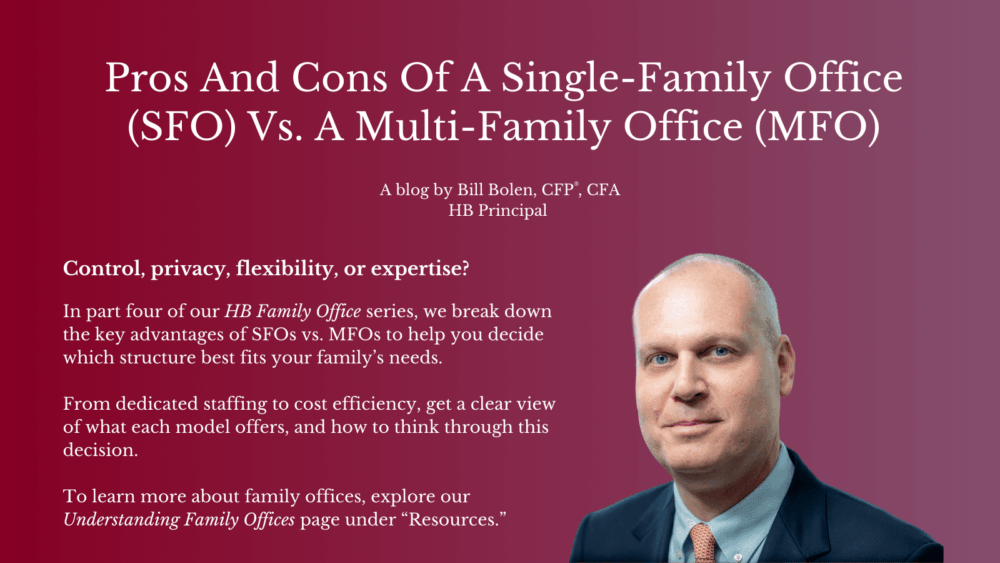In past blogs, we have reviewed what it means to have a family office of any kind, the difference between a single-family and multi-family office, and the key list of questions to NOT consider when deciding whether to set up your own single-family office (SFO). Here we are going to walk through the high-level pros and cons of the SFO vs. MFO decision and highlight why maybe this does not have to entirely be a “choice” in the literal sense for some families.
Advantages of the Single-Family Office
The main benefit of having your own SFO is complete control and priority, with dedicated staff serving your financial needs exclusively, around the clock. In some cases, the leader of your SFO may end up serving you for many decades, providing continuity across generations and a well-known person or persons that you can trust. Privacy can be greater in the SFO world, with very few people even having to know it exists unless they interact with your family office staff. Some families prioritize legacy aspects of an SFO over privacy, opting to establish it in a public location and engaging with the community through their family office location and staff. Ultimately, the SFO option allows the family to control what services they receive and when they receive them at the highest level of bespoke service possible – at least from the perspective of having dedicated staff committed to serving the family.
| SINGLE-FAMILY OFFICE | |
| PROS | CONS |
| – Complete control & priority – Dedicated, long-term staff – Enhanced privacy – Legacy & community engagement | – High operational and staffing costs – Requires significant time and oversight to manage effectively – Greater regulatory and compliance burdens – Limited external perspectives compared to multi-family collaboration |
Advantages of the Multi-Family Office
The MFO approach will never offer quite the same level of control and service as an SFO, but it can often get close while offering a lower cost and greater flexibility. Many families are happy to not hire, manage, and deal with full-time employees for everything in their financial life. The flexibility of accessing on-demand expertise can both reduce costs and enhance quality, as you can work with subject matter experts in each area of family office services without having to recruit them individually and pay their full salaries. Working with an MFO advisory team also leverages the broader expertise, perspectives, and best practices of a firm that serves multiple complex families and regularly collaborates with broad professional and vendor networks. Last, an MFO can deliver significant investor benefits by using its size and leverage to access investments at lower minimums and at more favorable cost structures than might be possible individually or through a smaller SFO.
| MULTI-FAMILY OFFICE | |
| PROS | CONS |
| – Cost efficiency & flexibility – On-demand expertise – Broader industry insights – Institutional investment access | – Less customization compared to an SFO – Shared services may not align with a family’s unique preferences – Reduced control over investment strategies and operational decisions – Potential confidentiality concerns due to multiple families being served by the same office |
The Bottom Line—Do What Makes Sense for Your Family
As an experienced MFO advisor, HB Family Office will naturally have a bias towards MFO solutions for many families. However, the right answer heavily depends on what matters most to you and how much you are willing to pay to meet those needs. This may mean working with a firm like HB Family Office for only some of your family office needs, or it may mean letting your HB Family Office team manage your entire financial life. We encourage you to learn more about your SFO and MFO options by speaking with an HB Family Office principal today.
To learn more about a family office, please visit us at https://homrichberg.com/resources/understanding-family-offices/, send an email to info@homrichberg.com, or call 404.264.1400.
Important Disclosures
This article may not be copied, reproduced, or distributed without Homrich Berg’s prior written consent.
All information is as of the date above unless otherwise disclosed. The information is provided for informational purposes only and should not be considered a recommendation to purchase or sell any financial instrument, product, or service sponsored by Homrich Berg or its affiliates or agents. The information does not represent legal, tax, accounting, or investment advice; recipients should consult their respective advisors regarding such matters. This material may not be suitable for all investors. Neither Homrich Berg nor any affiliates make any representation or warranty as to the accuracy or merit of this analysis for individual use. Information contained herein has been obtained from sources believed to be reliable but are not guaranteed. Investors are advised to consult with their investment professional about their specific financial needs and goals before making any investment decision.
©2025 Homrich Berg.


